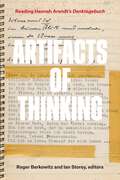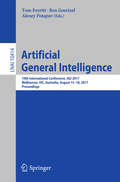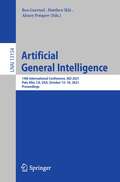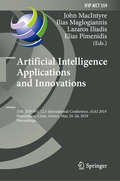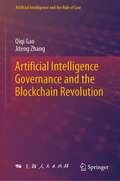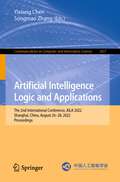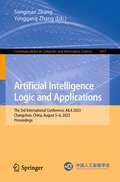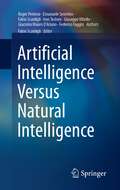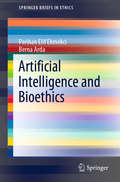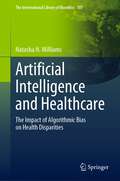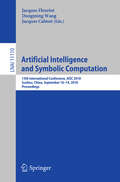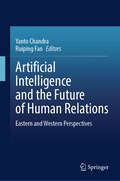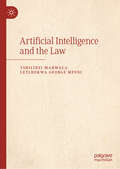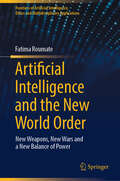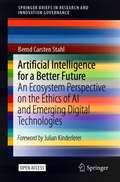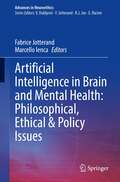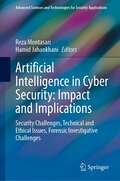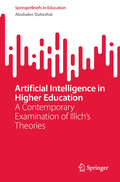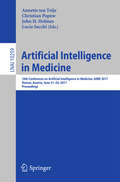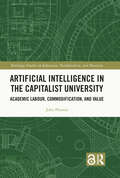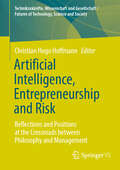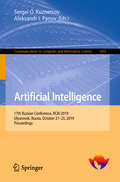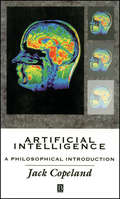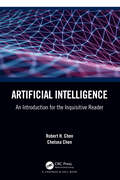- Table View
- List View
Artifacts of Thinking: Reading Hannah Arendt's Denktagebuch
by Roger Berkowitz and Ian StoreyArtifacts of Thinking: Reading Arendt’s “Denktagebuch” offers a path through Hannah Arendt’s recently published Denktagebuch, or “Book of Thoughts.” In this book a number of innovative Arendt scholars come together to ask how we should think about these remarkable writings in the context of Arendt’s published writing and broader political thinking.Unique in its form, the Denktagebuch offers brilliant insights into Arendt’s practice of thinking and writing. Artifacts of Thinking provides an introduction to the Denktagebuch as well as a glimpse of these fascinating but untranslated fragments that reveal not only Arendt’s understanding of “the life of the mind” but her true lived experience of it.
Artificial General Intelligence: 10th International Conference, AGI 2017, Melbourne, VIC, Australia, August 15-18, 2017, Proceedings (Lecture Notes in Computer Science #10414)
by Tom Everitt, Ben Goertzel and Alexey PotapovThis book constitutes the proceedings of the 10th International Conference on Artificial General Intelligence, AGI 2017, held in Melbourne, VIC, Australia, in August 2017. The 24 regular papers presented in this book together with 1 short paper were carefully reviewed and selected from 35 submissions. They cover topics such as architectures; mathematical foundations; algorithms; safety; understanding; human cognition; and philosophy.
Artificial General Intelligence: 14th International Conference, AGI 2021, Palo Alto, CA, USA, October 15–18, 2021, Proceedings (Lecture Notes in Computer Science #13154)
by Ben Goertzel Alexey Potapov Matthew IkléThis book constitutes the refereed proceedings of the 14th International Conference on Artificial General Intelligence, AGI 2021, held as a hybrid event in San Francisco, CA, USA, in October 2021.The 36 full papers presented in this book were carefully reviewed and selected from 50 submissions. The papers cover topics from foundations of AGI, to AGI approaches and AGI ethics, to the roles of systems biology, goal generation, and learning systems, and so much more.
Artificial Intelligence
by David L. Poole Alan K. MackworthConstraint-based reasoning is an important area of automated reasoning in artificial intelligence, with many applications. These include configuration and design problems, planning and scheduling, temporal and spatial reasoning, defeasible and causal reasoning, machine vision and language understanding, qualitative and diagnostic reasoning, and expert systems. Constraint-Based Reasoning presents current work in the field at several levels: theory, algorithms, languages, applications, and hardware. Constraint-based reasoning has connections to a wide variety of fields, including formal logic, graph theory, relational databases, combinatorial algorithms, operations research, neural networks, truth maintenance, and logic programming. The ideal of describing a problem domain in natural, declarative terms and then letting general deductive mechanisms synthesize individual solutions has to some extent been realized, and even embodied, in programming languages. Contents :- Introduction, E. C. Freuder, A. K. Mackworth. - The Logic of Constraint Satisfaction, A. K. Mackworth. - Partial Constraint Satisfaction, E. C. Freuder, R. J. Wallace. - Constraint Reasoning Based on Interval Arithmetic: The Tolerance Propagation Approach, E. Hyvonen. - Constraint Satisfaction Using Constraint Logic Programming, P. Van Hentenryck, H. Simonis, M. Dincbas. - Minimizing Conflicts: A Heuristic Repair Method for Constraint Satisfaction and Scheduling Problems, S. Minton, M. D. Johnston, A. B. Philips, and P. Laird. - Arc Consistency: Parallelism and Domain Dependence, P. R. Cooper, M. J. Swain. - Structure Identification in Relational Data, R. Dechter, J. Pearl. - Learning to Improve Constraint-Based Scheduling, M. Zweben, E. Davis, B. Daun, E. Drascher, M. Deale, M. Eskey. - Reasoning about Qualitative Temporal Information, P. van Beek. - A Geometric Constraint Engine, G. A. Kramer. - A Theory of Conflict Resolution in Planning, Q. Yang. A Bradford Book.
Artificial Intelligence Applications and Innovations: 15th IFIP WG 12.5 International Conference, AIAI 2019, Hersonissos, Crete, Greece, May 24–26, 2019, Proceedings (IFIP Advances in Information and Communication Technology #559)
by Elias Pimenidis Lazaros Iliadis Ilias Maglogiannis John MacIntyreThis book constitutes the refereed proceedings of the 15th IFIP WG 12.5 International Conference on Artificial Intelligence Applications and Innovations, AIAI 2019, held in Hersonissos, Crete, Greece, in May 2019.The 49 full papers and 6 short papers presented were carefully reviewed and selected from 101 submissions. They cover a broad range of topics such as deep learning ANN; genetic algorithms - optimization; constraints modeling; ANN training algorithms; social media intelligent modeling; text mining/machine translation; fuzzy modeling; biomedical and bioinformatics algorithms and systems; feature selection; emotion recognition; hybrid Intelligent models; classification - pattern recognition; intelligent security modeling; complex stochastic games; unsupervised machine learning; ANN in industry; intelligent clustering; convolutional and recurrent ANN; recommender systems; intelligent telecommunications modeling; and intelligent hybrid systems using Internet of Things. The papers are organized in the following topical sections:AI anomaly detection - active learning; autonomous vehicles - aerial vehicles; biomedical AI; classification - clustering; constraint programming - brain inspired modeling; deep learning - convolutional ANN; fuzzy modeling; learning automata - logic based reasoning; machine learning - natural language; multi agent - IoT; nature inspired flight and robot; control - machine vision; and recommendation systems.
Artificial Intelligence Governance and the Blockchain Revolution (Artificial Intelligence and the Rule of Law)
by Qiqi Gao Jiteng ZhangThis is the first professional academic work in China to discuss artificial intelligence and blockchain together. Artificial intelligence is a productivity revolution, and its development has a significant and profound impact on global changes. However, at the same time, its development also brings a series of challenges to human society, such as privacy, security, and fairness issues. Therefore, the significance of blockchain is even more prominent. Blockchain is a revolution in production relations, which will propose important solutions to the challenges of privacy, security, and fairness that arise after the development of artificial intelligence. The book not only discusses the problems currently faced by the development of artificial intelligence, as well as the new opportunities and challenges that artificial intelligence brings to future global governance, but also explains the further development direction of the intelligent revolution from the perspective of blockchain.
Artificial Intelligence Logic and Applications: The 2nd International Conference, AILA 2022, Shanghai, China, August 26–28, 2022, Proceedings (Communications in Computer and Information Science #1657)
by Songmao Zhang Yixiang ChenThis book constitutes refereed proceedings of the 2nd International Conference on Artificial Intelligence Logic and Applications 2022 held in Shanghai, China from August 26–28, 2022.The 20 full papers presented in this volume were carefully reviewed and selected from a total of 27 submissions. The papers in the volume are organised according to the following topical headings: program logic; fuzzy logic; applications; author index.
Artificial Intelligence Logic and Applications: The 3rd International Conference, AILA 2023, Changchun, China, August 5–6, 2023, Proceedings (Communications in Computer and Information Science #1917)
by Songmao Zhang Yonggang ZhangThis book constitutes the proceedings of the Third International Conference, AILA 2023, held in Changchun, China, during August 5–6, 2023. The 26 full papers and the 10 short papers included in this volume were carefully reviewed and selected from 56 submissions. This volume aims to provide novel ideas, original research achievements, and practical experiences in a broad range of artificial intelligence logic and applications.
Artificial Intelligence Versus Natural Intelligence
by Roger Penrose Emanuele Severino Ines Testoni Fabio Scardigli Giuseppe Vitiello Federico Faggin Giacomo Mauro D'ArianoThis book centers around a dialogue between Roger Penrose and Emanuele Severino about one of most intriguing topics of our times, the comparison of artificial intelligence and natural intelligence, as well as its extension to the notions of human and machine consciousness.Additional insightful essays by Mauro D'Ariano, Federico Faggin, Ines Testoni, Giuseppe Vitiello and an introduction of Fabio Scardigli complete the book and illuminate different aspects of the debate. Although from completely different points of view, all the authors seem to converge on the idea that it is almost impossible to have real "intelligence" without a form of "consciousness". In fact, consciousness, often conceived as an enigmatic "mirror" of reality (but is it really a mirror?), is a phenomenon under intense investigation by science and technology, particularly in recent decades. Where does this phenomenon originate from (in humans, and perhaps also in animals)? Is it reproducible on some "device"? Do we have a theory of consciousness today? Will we arrive to build thinking or conscious machines, as machine learning, or cognitive computing, seem to promise? These questions and other related issues are discussed in the pages of this work, which provides stimulating reading to both specialists and general readers.The Chapter "Hard Problem and Free Will: An Information-Theoretical Approach" is available open access under a Creative Commons Attribution 4.0 International License via link.springer.com.
Artificial Intelligence and Bioethics (SpringerBriefs in Ethics)
by Perihan Elif Ekmekci Berna ArdaThis book explores major bioethical issues emerging from the development and use of artificial intelligence in medical settings. The authors start by defining the past, present and future of artificial intelligence in medical settings and then proceed to address the resulting common and specific bioethical inquiries. The book discusses bioethical inquiries in two separate sets. The first set is comprised of ontological discussions mainly focusing on personhood and being an ethical agent of an artefact. The second set discusses bioethical issues resulting from the use of artificial intelligence. It focuses particularly on the area of artificial intelligence use in medicine and health services. It addresses the main challenges by considering fundamental principles of medical ethics, including confidentiality, privacy, compassion, veracity and fidelity. Finally, the authors discuss the ethical implications of involvement of artificial intelligence agents in patient care by expanding on communication skills in a case-based approach. The book is of great interest to ethicists, medical professionals, academicians, engineers and scientists working with artificial intelligence.
Artificial Intelligence and Healthcare: The Impact of Algorithmic Bias on Health Disparities (The International Library of Bioethics #107)
by Natasha H. WilliamsThis book explores the ethical problems of algorithmic bias and its potential impact on populations that experience health disparities by examining the historical underpinnings of explicit and implicit bias, the influence of the social determinants of health, and the inclusion of racial and ethnic minorities in data. Over the last twenty-five years, the diagnosis and treatment of disease have advanced at breakneck speeds. Currently, we have technologies that have revolutionized the practice of medicine, such as telemedicine, precision medicine, big data, and AI. These technologies, especially AI, promise to improve the quality of patient care, lower health care costs, improve patient treatment outcomes, and decrease patient mortality. AI may also be a tool that reduces health disparities; however, algorithmic bias may impede its success. This book explores the risks of using AI in the context of health disparities. It is of interest to health services researchers, ethicists, policy analysts, social scientists, health disparities researchers, and AI policy makers.
Artificial Intelligence and Symbolic Computation: 13th International Conference, AISC 2018, Suzhou, China, September 16–19, 2018, Proceedings (Lecture Notes in Computer Science #11110)
by Jacques Fleuriot Dongming Wang Jacques CalmetThis book constitutes the refereed proceedings of the 13th International Conference on Artificial Intelligence and Symbolic Computation, AISC 2018, held in Suzhou, China, in September 2018. The 13 full papers presented together with 5 short and 2 invited papers were carefully reviewed and selected from 31 submissions. The AISC conference is an important forum when it comes to ensuring that ideas, theoretical insights, methods and results from traditional AI can be discussed and showcased, while fostering new links with other areas of AI such as probabilistic reasoning and deep learning.
Artificial Intelligence and the Future of Human Relations: Eastern and Western Perspectives
by Ruiping Fan Yanto ChandraThis book stimulates new conversations around the ethical and policy considerations stemming from the influence of artificial intelligence (AI) on human relationships within a cross-cultural perspective. With chapters from distinguished scholars from Eastern and Western backgrounds, it delves into the fundamental aspects of human connections and good governance, examining them through the perspectives of both Eastern and Western values, while addressing the implications of AI. While the recognition of AI's substantial challenges to human values and effective governance is widespread, there exists a notable lack of focus on its impact on the essential human relationships that embody these values and encompass human identity within Eastern and Western traditions. By centering attention on this aspect, the book highlights a critical concern for the development of AI that is suitable for the future of human relationships and good governance. Specifically, the book seeks to examine the influence of AI on essential human relationships, such as those between parent and child, spouses, the elderly and the young, physician and patient, as well as relations between friends, citizens, and nations. It is an essential resource relevant to academics in philosophy, applied ethics and bioethics, AI ethics, social and political philosophy.
Artificial Intelligence and the Law
by Tshilidzi Marwala Letlhokwa George MpediThis textbook offers a starting point for the education of attorneys and other legal professionals about the potential impact of artificial intelligence (AI) on the law, as well as a forum for discussing artificial intelligence's legal and ethical concerns. Intended for classroom use, this book will help students, legal professionals and policymakers alike. AI is swiftly transforming the world, including the legal system. Legal applications to areas such as ethics, human rights, climate change, labor law, health, social protection, inequality, lethal autonomous weapons, the criminal justice system and autonomous vehicles, contract drafting, legal investigation, criminal analysis and evidence investigation, utilize AI. As AI becomes more sophisticated, its impact on the law will likely increase.
Artificial Intelligence and the New World Order: New weapons, New Wars and a New Balance of Power (Frontiers of Artificial Intelligence, Ethics and Multidisciplinary Applications)
by Fatima RoumateThis book discusses the implications of artificial intelligence (AI) on post-COVID-19 international relations. With the decline and fall of U.S. global leadership and the emergence of new powerful actors, as hastened by the global pandemic, new arms are now used in new forms of wars with new players. The balance of power swings between geostrategic interests and those linked to the global governance of virtual space and the race to technological sovereignty. Chapters focus on the challenges imposed by these changes on different parts of the international system—law, governance, diplomacy, international psychological security—and articulate new strategies and ethical policies as possible solutions. The volume is interdisciplinary and will appeal to researchers, students, and professionals across fields interested in the ethics of AI in the international system.
Artificial Intelligence for a Better Future: An Ecosystem Perspective on the Ethics of AI and Emerging Digital Technologies (SpringerBriefs in Research and Innovation Governance)
by Bernd Carsten StahlThis open access book proposes a novel approach to Artificial Intelligence (AI) ethics. AI offers many advantages: better and faster medical diagnoses, improved business processes and efficiency, and the automation of boring work. But undesirable and ethically problematic consequences are possible too: biases and discrimination, breaches of privacy and security, and societal distortions such as unemployment, economic exploitation and weakened democratic processes. There is even a prospect, ultimately, of super-intelligent machines replacing humans. The key question, then, is: how can we benefit from AI while addressing its ethical problems?This book presents an innovative answer to the question by presenting a different perspective on AI and its ethical consequences. Instead of looking at individual AI techniques, applications or ethical issues, we can understand AI as a system of ecosystems, consisting of numerous interdependent technologies, applications and stakeholders. Developing this idea, the book explores how AI ecosystems can be shaped to foster human flourishing. Drawing on rich empirical insights and detailed conceptual analysis, it suggests practical measures to ensure that AI is used to make the world a better place.
Artificial Intelligence in Brain and Mental Health: Philosophical, Ethical & Policy Issues (Advances in Neuroethics)
by Fabrice Jotterand Marcello IencaThis volume provides an interdisciplinary collection of essays from leaders in various fields addressing the current and future challenges arising from the implementation of AI in brain and mental health. Artificial Intelligence (AI) has the potential to transform health care and improve biomedical research. While the potential of AI in brain and mental health is tremendous, its ethical, regulatory and social impacts have not been assessed in a comprehensive and systemic way. The volume is structured according to three main sections, each of them focusing on different types of AI technologies. Part 1, Big Data and Automated Learning: Scientific and Ethical Considerations, specifically addresses issues arising from the use of AI software, especially machine learning, in the clinical context or for therapeutic applications. Part 2, AI for Digital Mental Health and Assistive Robotics: Philosophical and Regulatory Challenges, examines philosophical, ethical and regulatory issues arising from the use of an array of technologies beyond the clinical context. In the final section of the volume, Part 3 entitled AI in Neuroscience and Neurotechnology: Ethical, Social and Policy Issues, contributions examine some of the implications of AI in neuroscience and neurotechnology and the regulatory gaps or ambiguities that could potentially hamper the responsible development and implementation of AI solutions in brain and mental health. In light of its comprehensiveness and multi-disciplinary character, this book marks an important milestone in the public understanding of the ethics of AI in brain and mental health and provides a useful resource for any future investigation in this crucial and rapidly evolving area of AI application. The book is of interest to a wide audience in neuroethics, robotics, computer science, neuroscience, psychiatry and mental health.
Artificial Intelligence in Cyber Security: Security Challenges, Technical and Ethical Issues, Forensic Investigative Challenges (Advanced Sciences and Technologies for Security Applications)
by Hamid Jahankhani Reza MontasariThe book provides a valuable reference for cyber security experts, digital forensic practitioners and network security professionals. In recent years, AI has gained substantial attention from researchers in both academia and industry, and as a result AI’s capabilities are constantly increasing at an extraordinary pace. AI is considered to be the Fourth Industrial Revolution or at least the next significant technological change after the evolution in mobile and cloud computing technologies. AI is a vehicle for improving the quality of our lives across every spectrum with a broad range of beneficial applications in various sectors. Notwithstanding its numerous beneficial use, AI simultaneously poses numerous legal, ethical, security and privacy challenges that are compounded by its malicious use by criminals. These challenges pose many risks to both our privacy and security at national, organisational and individual levels.In view of this, this book aims to help address some of these challenges focusing on the implication, impact and mitigations of the stated issues. The book provides a comprehensive coverage of not only the technical and ethical issues presented by the use of AI but also the adversarial application of AI and its associated implications. The authors recommend a number of novel approaches to assist in better detecting, thwarting and addressing AI challenges. The book also looks ahead and forecasts what attacks can be carried out in the future through the malicious use of the AI if sufficient defences are not implemented. The research contained in the book fits well into the larger body of work on various aspects of AI and cyber security.It is also aimed at researchers seeking to obtain a more profound knowledge of machine learning and deep learning in the context of cyber security, digital forensics and cybercrime. Furthermore, the book is an exceptional advanced text for Ph.D. and master’s degree programmes in cyber security, digital forensics, network security, cyber terrorism and computer science. Each chapter contributed to the book is written by an internationally renowned expert who has extensive experience in law enforcement, industry or academia. Furthermore, this book blends advanced research findings with practice-based methods to provide the reader with advanced understanding and relevant skills.
Artificial Intelligence in Higher Education: A Contemporary Examination of Illich's Theories (SpringerBriefs in Education)
by Abubaker QutieshatThis book is multi-dimensional exploration of Ivan Illich's critique of institutionalized education. It dissects, analyzes, and understands the implications of his critique for the future of education in a world increasingly influenced by technology, particularly artificial intelligence (AI). The book outlines the problems with current educational systems and discusses potential alternatives, considering the role of modern technology like AI. It employs a multi-disciplinary approach, incorporating historical analysis, philosophical inquiry, and practical considerations to explore Illich's critique. Readers will be equipped with the knowledge to critically assess the educational landscape and consider viable alternatives for reform. This book contributes to the field of educational theory and practice in its nuanced understanding of Illich's critique and its implications for educational reform. It serves as both a theoretical exploration and a practical guide, making it a valuable resource for a wide range of readers, including educators, policymakers, students, and anyone interested in the future of education.
Artificial Intelligence in Medicine: 16th Conference on Artificial Intelligence in Medicine, AIME 2017, Vienna, Austria, June 21-24, 2017, Proceedings (Lecture Notes in Computer Science #10259)
by Annette ten Teije, Christian Popow, John H. Holmes and Lucia SacchiThis book constitutes the refereed proceedings of the 16th Conference on Artificial Intelligence in Medicine, AIME 2017, held in Vienna, Austria, in June 2017.The 21 revised full and 23 short papers presented were carefully reviewed and selected from 113 submissions. The papers are organized in the following topical sections: ontologies and knowledge representation; Bayesian methods; temporal methods; natural language processing; health care processes; and machine learning, and a section with demo papers.
Artificial Intelligence in the Capitalist University: Academic Labour, Commodification, and Value (Routledge Studies in Education, Neoliberalism, and Marxism)
by John PrestonUsing Marxist critique, this book explores manifestations of Artificial Intelligence (AI) in Higher Education and demonstrates how it contributes to the functioning and existence of the capitalist university. Challenging the idea that AI is a break from previous capitalist technologies, the book offers nuanced examination of the impacts of AI on the control and regulation of academic work and labour, on digital learning and remote teaching, and on the value of learning and knowledge. Applying a Marxist perspective, Preston argues that commodity fetishism, surveillance, and increasing productivity ushered in by the growth of AI, further alienates and exploits academic labour and commodifies learning and research. The text puts forward a solid theoretical framework and methodology for thinking about AI to inform critical and revolutionary pedagogies. Offering an impactful and timely analysis, this book provides a critical engagement and application of key Marxist concepts in the study of AI’s role in Higher Education. It will be of interest to those working or researching in Higher Education.
Artificial Intelligence, Entrepreneurship and Risk: Reflections and Positions at the Crossroads between Philosophy and Management (Technikzukünfte, Wissenschaft und Gesellschaft / Futures of Technology, Science and Society)
by Christian Hugo HoffmannThis book embarks on a thought-provoking journey that seeks to illuminate the intricate connections between the dynamic realms of AI, Entrepreneurship and Risk Management. This book illuminates the philosophical foundations of AI, examines the fundamental beliefs surrounding AI's nature, and its effects for the human condition. Drawing on the works of eminent philosophers, economists and business leaders alike, the authors of this volume engage in inspirational discussions on ethics, philosophy of technology, and the potential societal ramifications of advancing AI technologies. By grounding the exploration in philosophical reflections, the authors set the stage for a comprehensive understanding of AI's role in entrepreneurship and the inherent risks it entails.
Artificial Intelligence: 17th Russian Conference, RCAI 2019, Ulyanovsk, Russia, October 21–25, 2019, Proceedings (Communications in Computer and Information Science #1093)
by Sergei O. Kuznetsov Aleksandr I. PanovThis book constitutes the proceedings of the 17th Russian Conference on Artificial Intelligence, RCAI 2019, held in Ulyanovsk, Russia, in October 2019. The 23 full papers presented along with 7 short papers in this volume were carefully reviewed and selected from 130 submissions. The conference deals with a wide range of topics, including multi-agent systems, intelligent robots and behaviour planning; automated reasoning and data mining; natural language processing and understanding of texts; fuzzy models and soft computing; intelligent systems and applications.
Artificial Intelligence: A Philosophical Introduction
by Jack CopelandPresupposing no familiarity with the technical concepts of either philosophy or computing, this clear introduction reviews the progress made in AI since the inception of the field in 1956. Copeland goes on to analyze what those working in AI must achieve before they can claim to have built a thinking machine and appraises their prospects of succeeding. There are clear introductions to connectionism and to the language of thought hypothesis which weave together material from philosophy, artificial intelligence and neuroscience. John Searle's attacks on AI and cognitive science are countered and close attention is given to foundational issues, including the nature of computation, Turing Machines, the Church-Turing Thesis and the difference between classical symbol processing and parallel distributed processing. The book also explores the possibility of machines having free will and consciousness and concludes with a discussion of in what sense the human brain may be a computer.
Artificial Intelligence: An Introduction for the Inquisitive Reader
by Robert H. Chen Chelsea C. ChenArtificial Intelligence: An Introduction for the Inquisitive Reader guides readers through the history and development of AI, from its early mathematical beginnings through to the exciting possibilities of its potential future applications. To make this journey as accessible as possible, the authors build their narrative around accounts of some of the more popular and well-known demonstrations of artificial intelligence including Deep Blue, AlphaGo and even Texas Hold’em, followed by their historical background, so that AI can be seen as a natural development of mathematics and computer science. As the book moves forward, more technical descriptions are presented at a pace that should be suitable for all levels of readers, gradually building a broad and reasonably deep understanding and appreciation for the basic mathematics, physics, and computer science that is rapidly developing artificial intelligence as it is today. Features Only mathematical prerequisite is an elementary knowledge of calculus Accessible to anyone with an interest in AI and its mathematics and computer science Suitable as a supplementary reading for a course in AI or the History of Mathematics and Computer Science in regard to artificial intelligence.
